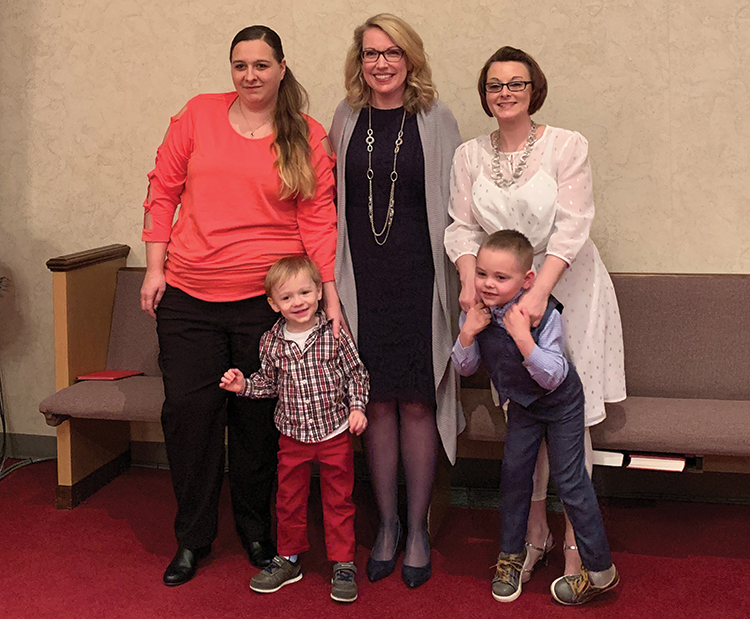Chris Biehn, Program Coordinator | Office of Court Services

Substance use and addiction are frequently associated with parental neglect and abuse of children. In 2017, over 55 percent of all child removals in Indiana resulted from parental substance use, a figure well above the national average of 36¹ percent. Complicating matters, parents battling substance use disorder often experience physical and mental illness. According to the National Survey on Drug Use and Health, 9.2 million U.S. adults experienced both mental illness and a substance use disorder in 2018.² Family Recovery Courts aim to tackle this crisis.
The Role of FRCs
Launched in the mid-1990s, FRCs are problem-solving courts which target cases of child abuse or neglect where the parent or primary caregiver suffers from a substance use disorder or other mental illness. These courts, of which there are over 370 nationwide, strive to provide better outcomes for children involved with the child welfare system by providing services to the child’s parent or primary caregiver. FRCs may be used in cases where a child has been removed from the family home or, when appropriate, in cases involving a child in need of services. Modeled on drug courts, which focus on treatment, FRCs apply a non-adversarial collaborative approach, relying on a multidisciplinary team of judges, Department of Child Services attorneys, public defenders, case managers, and treatment providers. To reinforce positive behavior and to hold parents and caregivers accountable during their participation in the program, FRCs utilize incentives and graduated sanctions that consider the impact on the children and family as a unit.
FRCs also provide the family a full range of services, including parenting skills training, domestic violence counseling, health care, and developmentally appropriate services. FRCs combine these services with the traditional approach to juvenile cases, taking the least restrictive action possible to keep children safe and striving for reunification when children have been removed. As a result of this approach, a recent study found that families who participate in FRC programs are twice as likely to reunify than families receiving traditional child welfare services.³
While other problem-solving courts generally require participation for a minimum of 18 months, Adoption and Safe Families Act requirements mandate courts to finalize permanency recommendations 12 months after a child enters foster care. Additionally, courts are required to begin termination of parental rights proceedings after a child has been removed from the home for 15 of the last 22 months. These requirements complicate an already delicate timeline which must consider the safety of the child and the lasting sobriety of the parent/caregiver. FRCs provide a mechanism by which courts may expedite the often-lengthy timeline of connecting a parent/caregiver with treatment providers and making progress toward permanency. The Grant County Family Recovery Court has demonstrated success by returning children to their home 54 days, on average, sooner than families who are not receiving services from the FRC.
A Committed Approach to FRCs in Indiana
The Indiana Supreme Court has remained committed to collaborative approaches at the local level. Over the last 18 months, the Court—in partnership with DCS, Children and Family Futures, and the Department of Justice’s Office of Juvenile Justice and Delinquency Prevention—sponsored a FRC Best Practices Training program and a Family Recovery Implementation Training program. These programs mark the efforts of multiple stakeholders and represent the innovative role of courts confronting common problems.
In December 2018, Indiana Supreme Court Justice Christopher Goff convened a meeting of stakeholders to address challenges and barriers to the expansion of FRCs in Indiana. Representatives from the Indiana Supreme Court, DCS, Indiana Division of Mental Health and Addiction, the Indiana Public Defender Council, and private treatment providers have met regularly to overcome the identified barriers. The deliberate effort to expand the availability of FRCs has resulted in the near doubling of certified FRCs to twelve with the tripling of certified FRCs on the horizon. Currently, the following counties have certified FRCs: Allen, Bartholomew, Boone, Clark, Delaware, Grant, Howard, Marion, Noble, Vanderburgh, Vigo, and Wabash. Counties in the planning stages of establishing a certified FRC include: DeKalb, Floyd, Knox, LaPorte, Pulaski, and Wayne.
Establishing an FRC in Your Community
If you are interested in joining your colleagues around the state in establishing an FRC in your county, we are here to help. We can answer any questions you might have about how you and your community can use the FRC collaborative approach to address some of the core issues driving families into the child-welfare system and to safely reunify families. We can help guide you through the process of establishing your own FRC.
Contact [email protected] or [email protected] for help establishing a Family Recovery Court.
¹ U.S. Department of Health and Human Services, Administration for Children and Families, Administration on Children, Youth and Families, Children’s Bureau (2017).
² Substance Abuse and Mental Health Services Administration. (2019). Key substance use and mental health indicators in the United States: Results from the 2018 National Survey on Drug Use and Health (HHS Publication No. PEP19-5068, NSDUH Series H-54). Rockville, MD: Center for Behavioral Health Statistics and Quality, Substance Abuse and Mental Health Services Administration. Retrieved from samhsa.gov/data
³ Center for Children and Family Futures and National Association of Drug Court Professionals (2019). Family Treatment Court Best Practice Standards. Prepared for the Office of Juvenile Justice and Delinquency Prevention Office of Justice Programs, U.S. Department of Justice